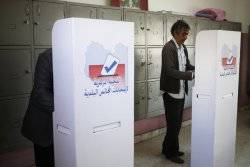Libya's deputy parliamentary speaker has rejected the election of the country's new Prime Minister, in the latest political struggle to strike the North African country.
Hours after Ahmed Maiteeq was sworn in as prime minister, the deputy speaker declared the vote as invalid, as a power struggle erupted in the assembly.
According to a letter published on a government website on Sunday, deputy parliamentary minister Ezzedin al-Awami cited Maiteeq's failure to obtain the necessary quorum during a parliamentary vote earlier in the day.
After a chaotic session of parliament, Maiteeq was initially reported to have mustered 113 votes of the 120 needed under the constitution in a vote of confidence.
But the second deputy of parliament, Saleh al-Makhzoun said Maiteeq had in fact clinched 121 votes, apparently after a recount, defeating challenger Omar al-Hassi, a university professor.
"Ahmed Maiteeq is officially the new prime minister," al-Makhzoun said as some politicians immediately challenged Maiteeq's appointment by shouting.
Al-Sharif al-Wafi, an independent politician from Benghazi told the Associated Press news agency the swearing-in was unconstitutional and defied democratic principles.
'Violations'
The second deputy of parliament continued the session after the first deputy had adjourned the session following the vote and ensuing chaos, Al-Wafi said.
MP Fatma al-Majbari told Libyan TV station Al-Ahrar; "There are violations in today's session," adding the new votes came after the session was adjourned.
Libya's 185-seat interim parliament has been deadlocked and unable to impose authority after Abdullah al-Thinni resigned as prime minister three weeks ago, citing an attack by gunmen on his family.
Thinni resigned just one month after his election, when he replaced Ali Zeidan who was voted out of office after rebels humiliated the government by shipping crude on a tanker without government permission. The tanker was ultimately seized by US forces and returned to the country.
Libya has seen a severe deterioration in security since the end of Muammar Gaddafi's decades-long rule in 2011.
PHOTO CAPTION
Men mark their ballots in voting booths during the municipal election at a polling station in Benghazi April 19, 2014.
Aljazeera


 Home
Home Discover Islam
Discover Islam Quran Recitations
Quran Recitations Lectures
Lectures
 Fatwa
Fatwa Articles
Articles Fiqh
Fiqh E-Books
E-Books Boys & Girls
Boys & Girls  Hajj Rulings
Hajj Rulings Hajj Fatwas
Hajj Fatwas














